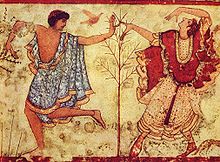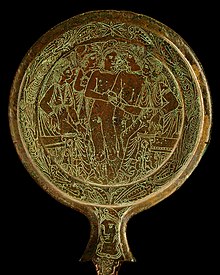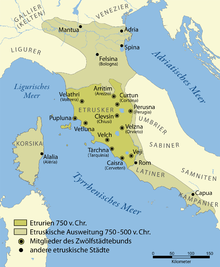Etruscan religion
The origin of the mythical-theistic religion of the Etruscans - they called themselves Rasenna, among the Greeks they were called Tyrsians and among the Romans Tusci or Etrusci - is as largely in the dark as the origin of this people itself, which never formed a territorial state, only a mainly ritual vaulted twelve-city federation, speculative in science to this day. The last of these twelve cities, Vetulonia, was discovered towards the end of the 19th century by the Italian physician and archaeologist Isidoro Falchi. In any case, they only became comprehensible as a people in Italy, in whose cultural environment they were firmly integrated. Apart from Greek reports (e.g. in Hesiod), which tend to be mythical and contradictory, we know more about them mainly from Roman sources, and these sources date from the first century B.C. at the earliest, are selective to fragmentary and often one-sided. Complicating matters further, the Etruscan language is hardly deciphered, although it can be read, for the Etruscans used a Greek alphabet (the Euboean variety).
Especially in later periods, this religion was also strongly influenced by Greek mythology. On the other hand, the original layer is hardly recognizable, not even its myths are known more precisely or only through Roman traditions, the same applies to its theology and essential aspects of its cult, especially its early forms. In contrast to the pre-Christian religions of the Occident, it was also a prophetically mediated religion of revelation, which in turn speaks more for an oriental origin, as does the style of art in the orientalizing phase of Etruscan culture, especially since the first such religions in the Orient existed in Egypt, Mesopotamia, Judaism and Zoroastrianism, which is why parallels are often drawn here.
Despite the massive Greek influences and its mixed character, the Etruscan religion is, however, completely non-Greek at its core, proclaiming the total submission of man to the divine will, to which man is nothing. For the Etruscans, therefore, their religion was of central importance and reached deep into the individual way of life. The so-called Etrusca disciplina (Latin disciplina: teaching, instruction, science), consisting of books that were strictly guarded by the priests as secret knowledge and contained precise instructions for the performance of oracles, provided the model and regulations for this. In ancient times, this Etrusca disciplina - the teaching of the interpretation of divine signals, i.e. the technique of divination (to Latin divinare: to have a divine inspiration) and of the correct dealings with the world of the gods was famous far beyond Etruria. Liver show (haruspizium), the interpretation of bird flight (auspices) and lightning (fulgural discipline) were just as much a part of this teaching as the correct procedure in land surveying, administration or the construction of water pipes. However, the original texts of the disciplines were already largely lost by Roman times. The related cosmology is extraordinarily complex and also only preserved in outline.

Funerary fresco depicting the joys of the afterlife. Tomba del Triclinio, 480 BC, Necropolis of Monterozzi (Tarquinia)

Louvre: Etruscan bronze mirror from the 4th to 3rd century BC; it shows the "Judgment of Paris" and thus the great influence that Greek culture had on Etruscan culture at that time.

Map of the Etruscan territories with the twelve cities of the Etruscan League of Cities as well as other important cities founded by the Etruscans. The Tyrrhenian Sea was the "domestic sea" of the Etruscans and is named after them.
Search within the encyclopedia